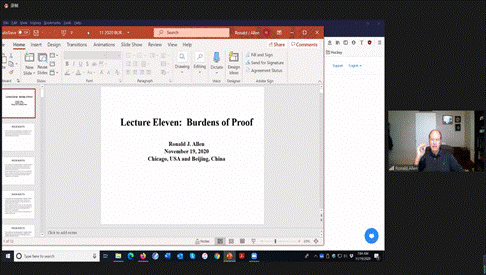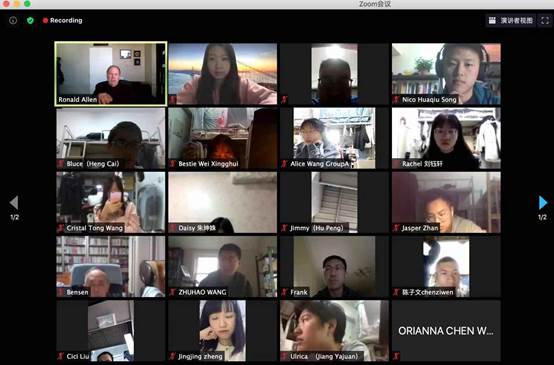Invited by the “2011 Plan - China Collaborative Innovation Center of Judicial Civilization”, the “111 Plan - Base for Evidence Science Innovation and Talent Recruitment” and “Key Laboratory of Evidence Science,CUPL,Ministry of Education, China”, Ronald J. Allen, a John Henry Wigmore Professor at U.S. Northwestern University Pritzker School of Law, delivered a curriculum on the topic of “Introduction to the Law and Field of Evidence” for our students. This curriculum is taught online owing to the Covid-19.

Professor Ronald J. Allen gave 12 lessons surrounding the topic of this curriculum. The first lesson made an introduction to basic concepts of the American form of government and its legal process, and a comparison to Chinese way; the second lesson introduced the field of evidence; the third one illustrated how American legal system functions by analyzing a real case “Johnson Case”; the fourth to eighth lessons concentrated on the concept of relevance and admissibility rules of evidence relating to it; the ninth mainly analyzed the rule of hearsay; the tenth explained the belief is wrong that the rule of hearsay hinders admissibility of evidence; the eleventh explained the concept and meaning of production burden in American evidence law; the twelfth taught and discussed lay opinions and expert evidence which is the most important, such as expert’s testimony. The whole lessons involved comprehensive contents and were arranged reasonably and subtly, opening up extra windows of American evidence law for students.

Professor Allen used a question-and-answer mode to divide the course into teaching part and question answering part. In the teaching section, he drew every point of knowledge in detail, and made it easy for students to understand the complex rules of American evidence. In the questions answering section, he asked the students to use the principle of the evidence law to answer the case questions, encouraged the students to show the different academic views, and welcomed the students to ask questions at any time and to make specific solutions for the questions. Unlike the traditional Chinese teaching pattern, Professor Allen requires students to read a lot of materials and cases before class. Students were divided into different groups to discuss the questions, and developed group view to express. This course is not only a challenge for students, but full of strong sense of freshness and accomplishment, which makes them fully aware of the free and open teaching pattern of foreign countries.
This course can not only help students better understand the knowledge of American evidence law, but also open a new research perspective of evidence law for Chinese students. Meanwhile, it provides a platform for exchange of domestic and foreign evidence law scholars. This course is not only fully supported by the Institute of Evidence Law and Forensic Science, China University of Political Science and Law, but also welcomed by students. Due to the online live broadcast teaching method, it also provides convenience for teachers and students at other universities, on-the-job police, lawyers and other legal practitioners to come to audit and join the course, which further expands the influence of the Institute of Evidence Science and Forensic Science, CUPL.